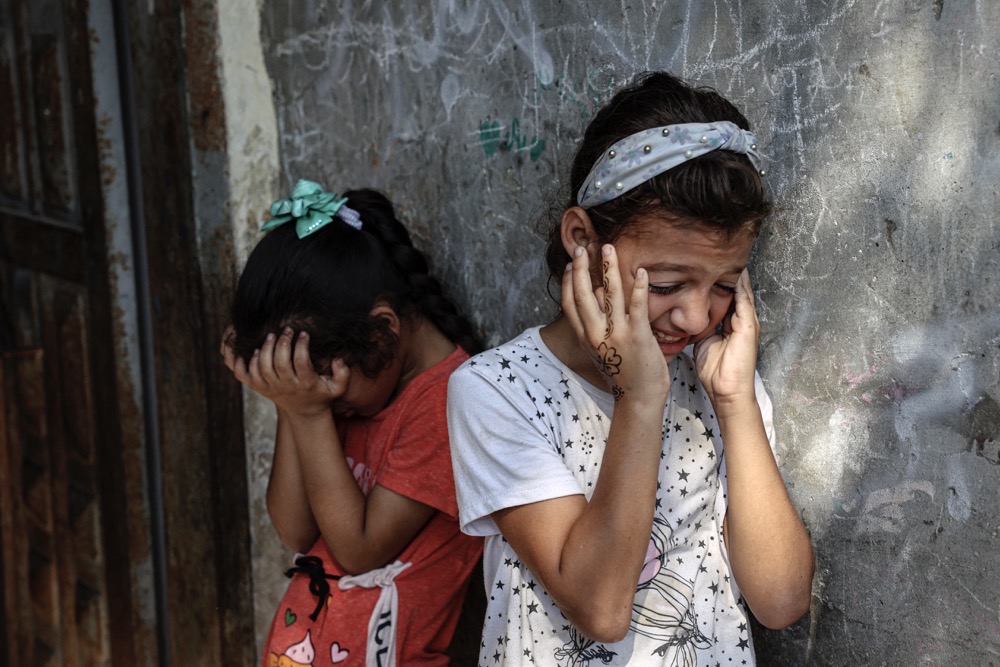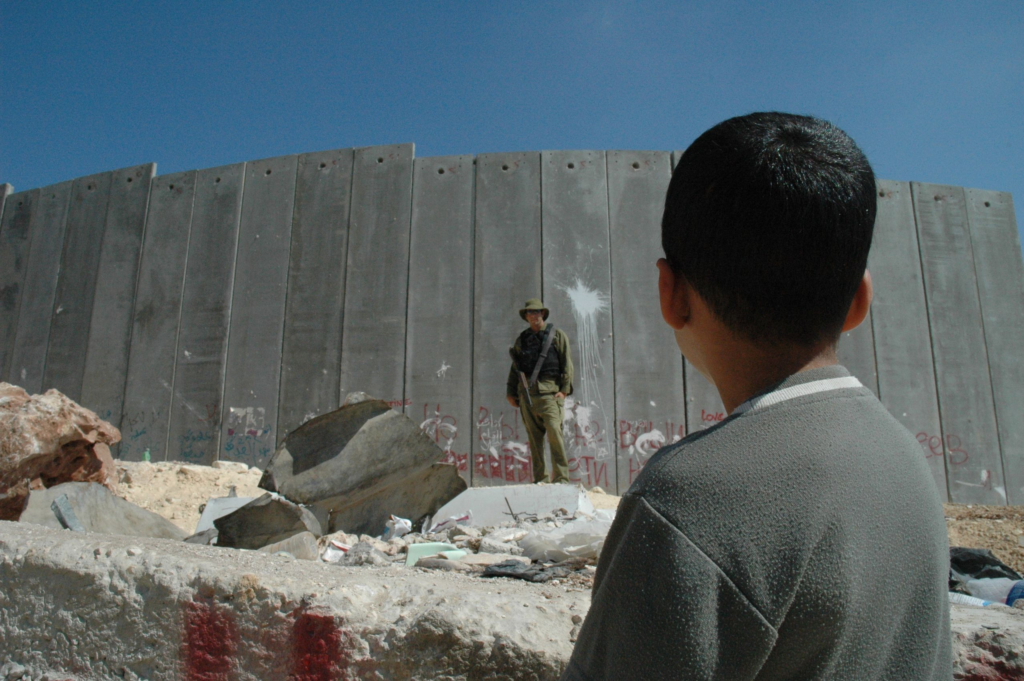Seven-year-old Hala at the SOS Children’s Village in Rafah, in the southern Gaza Strip, lives under the constant threat of bombs falling nearby. Her parents and two brothers were killed in November 2023 during the murderous bombardment by Israeli forces.
Since October 7, 2023, the ruthless bombardment of densely populated civilian areas has exacerbated the already-critical mental health crisis for Gaza’s children with far-reaching consequences, as coping strategies and safe spaces are ripped away and mental health services and assistance are cut off.
In a study conducted in Nov 2023, the nonprofit organization Save the Children interviewed nearly 500 children and 160 parents in Gaza. It was found that 80 percent of children showed symptoms of emotional distress. About half of these children had verbalized suicidal ideas, and three out of five indulged in self-harming and/or risk-taking behaviors.
The current attack in Gaza has brought an unprecedented level of trauma to the children in Gaza. There is no safe place and no sense of security, with thousands displaced from their homes. Caregivers are themselves fighting for survival and are unable to help children cope with their overwhelming emotional reactions.
Children in Gaza are experiencing a multitude of psychological symptoms, including anxiety, fear, worry about their safety and of their loved ones, nightmares and disturbing flashbacks, insomnia, bottling up emotions, and withdrawing from loved ones without any support.
Looking at the war in Gaza from the lens of trauma neuroscience, Dr. Ali Jawaid, with his colleagues, has written an editorial for the scientific journal “Mental Health & Prevention.”
Dr. Ali Jawaid, MD-PhD is a Neuroscience researcher working on the long-term effects and transgenerational transmission of Adverse Childhood Experiences (ACE).
Talking to Scientia Pakistan, Dr Jawaid said that in the editorial, drawing from the concrete scientific evidence, they argue how transgenerational trauma forms the very core of the war in Gaza.

What is Transgenerational trauma?
According to Dr Jawaid, transgenerational trauma is an emerging scientific concept, which implies that the effects of psychological trauma can be transmitted from one generation to another.
To put it in simple words- if a parent is exposed to intense and/or prolonged stress in their life before becoming a parent, psychological symptoms will be passed onto their children, even if the children are not directly exposed to any significant trauma themselves.
How is trauma passed down through generations?
Dr Jawaid told Scientia Pakistan that “the effects of traumatic experiences can be passed down generations through psychosocial, as well as biological paths.”
“Psychosocial transmission implies that individuals who are exposed to overwhelming or persistent trauma may develop unhealthy behavioral patterns, which can impair their family life and parenting style. In this case, their children will experience neglect and negativity, eventually culminating in deficits in their own mental functioning,” he explained.
“More importantly, recent research, including our own work, indicates that psychological stress and trauma directly impact our reproductive cells, eggs, and sperm. As the fetus, the start of a new life, is formed from fertilization of sperm and egg; these effects are passed onto the offspring.”
How will the ongoing war in GAZA precipitate a vicious cycle of transgenerational trauma in the region?
Talking to Scientia Pakistan, Dr Jawaid said, “To answer this question, we have to draw from scientific studies, as well as seek guidance from history.”
“Scientific studies confirm transgenerational effects of Holocaust in Jewish communities. While it does not justify the atrocities Israel is inflicting on Gaza, it reflects that they are living in a state of fear and existential crisis due to their own transgenerational traumas,” he debates.
“Contrary, the attack on civilians in Gaza is one of the most unfortunate crises of human history where the children have been traumatized the most. Not only have thousands of children been murdered, but tens of thousands have been left without a surviving family.”
Dr Jawaid further explained that “Science tells us that childhood is the most vulnerable period for the effects of traumatic experiences on the brain and the germline. Thus, it is feared that these children will suffer from substantial mental health challenges, and the psychological scars of the bloodshed they are witnessing around them may trickle down generations.”

“I would like to reiterate this- losing parents, witnessing death, and starvation- each one of these is a risk factor for mental health impairment and transgenerational trauma, and the children in Gaza are unfortunately subjected to all these risk factors- all at once’’, he concluded.
What does Science predict about the extent of the transgenerational effects of psychological trauma in children?
Dr Ali Jawaid told Scientia Pakistan that “our research, substantiated from other scientific investigations, reveals that the transgenerational effects of psychological trauma during childhood extend beyond just mental health.”
“Not only those directly affected, but also their children, have an increased risk of depression, anxiety, risk-taking, and cognitive impairment, as well as metabolic perturbations and immunological changes.”
“To lay it out in simple language, one can say that psychological trauma, especially during childhood, puts those affected, as well as their children, at an increased risk for severe impairment in both mental and physical health,” he explained.
What does scientific research recommend on how the risk or effects of transgenerational trauma can be reduced, especially in the Gaza context?
According to Dr Jawaid, unfortunately, several science-based recommendations about how transgenerational trauma could be reduced cannot even be currently implemented in Gaza.
“A study from Gapp et al. showed that intergenerational effects of early life stress in a rodent model could be reduced by environmental enrichment- a strategy that combines physical, cognitive, and social stimulation.”
“However, due to extreme infrastructure destruction, it is not possible to envision how such multi-modality physical and mental health care could be provided to the suffering people in Gaza.”
“Nevertheless, the aid agencies could implement ‘psychological first aid’, a concept developed in the early 2000s that is focused on reducing the immediate mental health impact of human disasters.”
“It is also important to recognize their basic psychological needs and autonomy as humans. I want to quote the words of the Palestinian permanent observer to the United Nations, Mr. Riyad Mansour ‘Palestinian children should be treated as children and not as a demographic threat”.
With the final words, Dr. Ali Jawaid stresses that ‘’As scientists working on transgenerational trauma, we appeal to the world powers to ensure an immediate and permanent ceasefire in Gaza followed by an open condemnation and apology for the loss of civilian life there and sincere efforts for reconciliation and reconstruction.
We warn that each WCNSF (Wounded Child, No Surviving Family) is a wound on humanity, and if we don’t bandage these wounds now, they will bleed for generations.’’
References:
- Save the Children research. https://www.savethechildren.net/news/children-s-mental-health-gaza-pushed-beyond-breaking-point-after-nearly-month-siege-and
- Dr Ali Jawaid’s Editorial. https://www.sciencedirect.com/science/article/pii/S2212657024000072?dgcid=author
- A study from Gapp et al. https://www.ncbi.nlm.nih.gov/pmc/articles/PMC5026744/


Saadeqa Khan is the founder, CEO, & Editor-in-Chief of Scientia Pakistan. She’s a member of the Oxford Climate Journalism Network (Second Cohort) and NASW. Saadeqa is a fellow of NPF Washington, The Falling Walls Foundation, and the Science Journalism Forum. Saadeqa has won several international journalism grants and awards for her reports.

